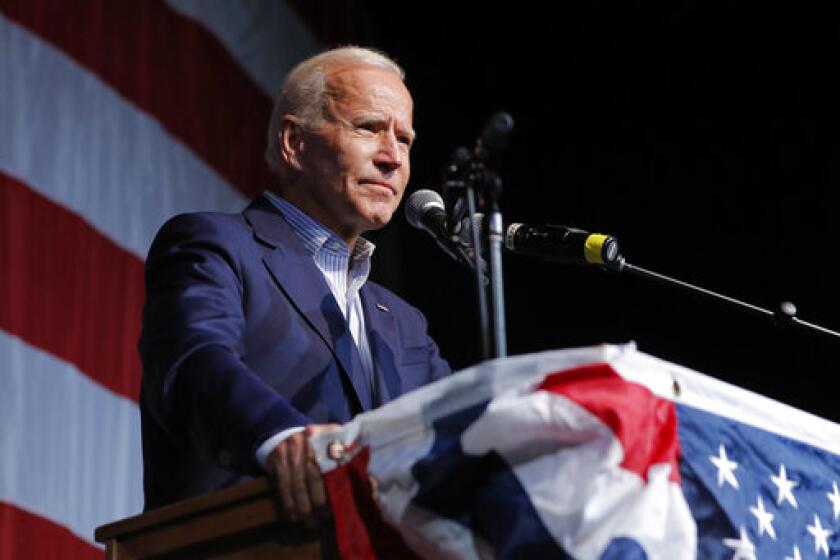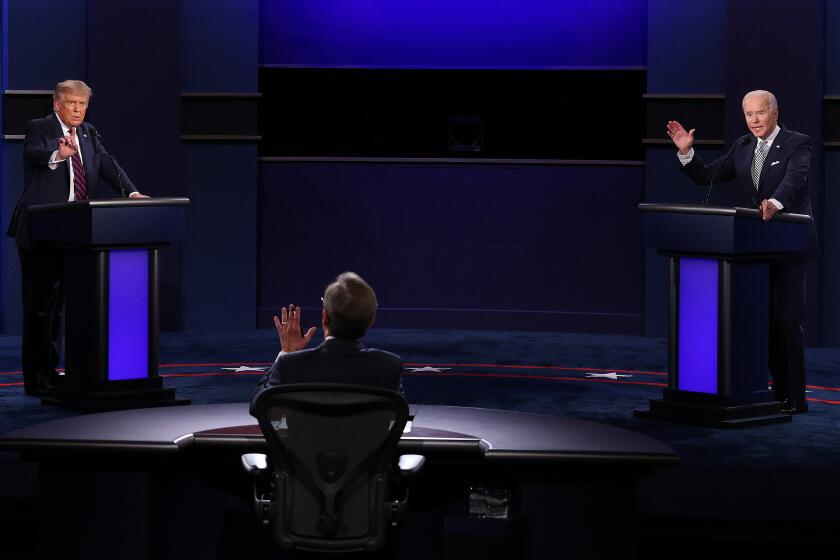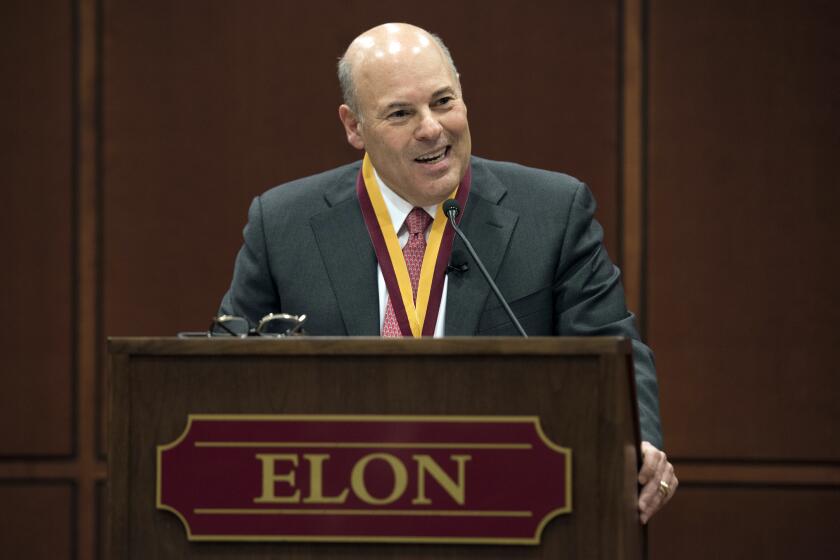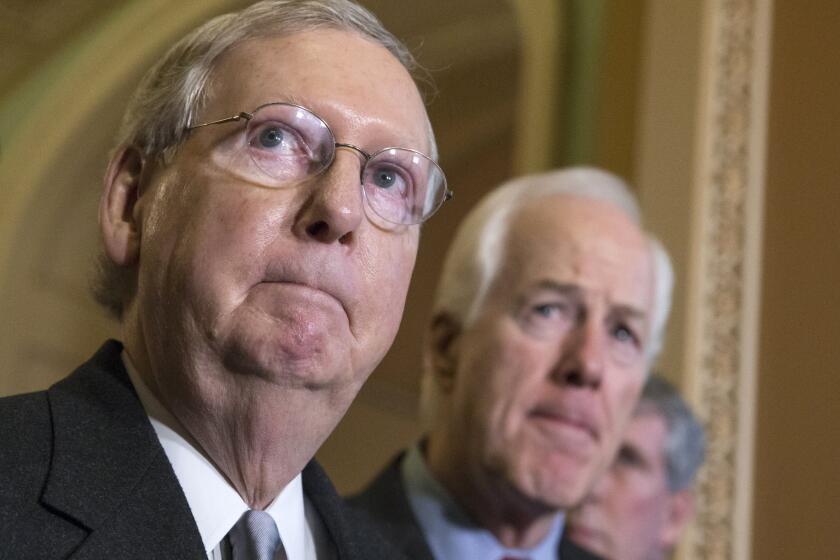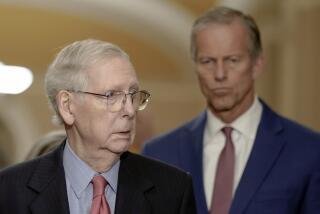Column: Republicans have destroyed the idea of the ‘loyal opposition’ — and eroded democracy
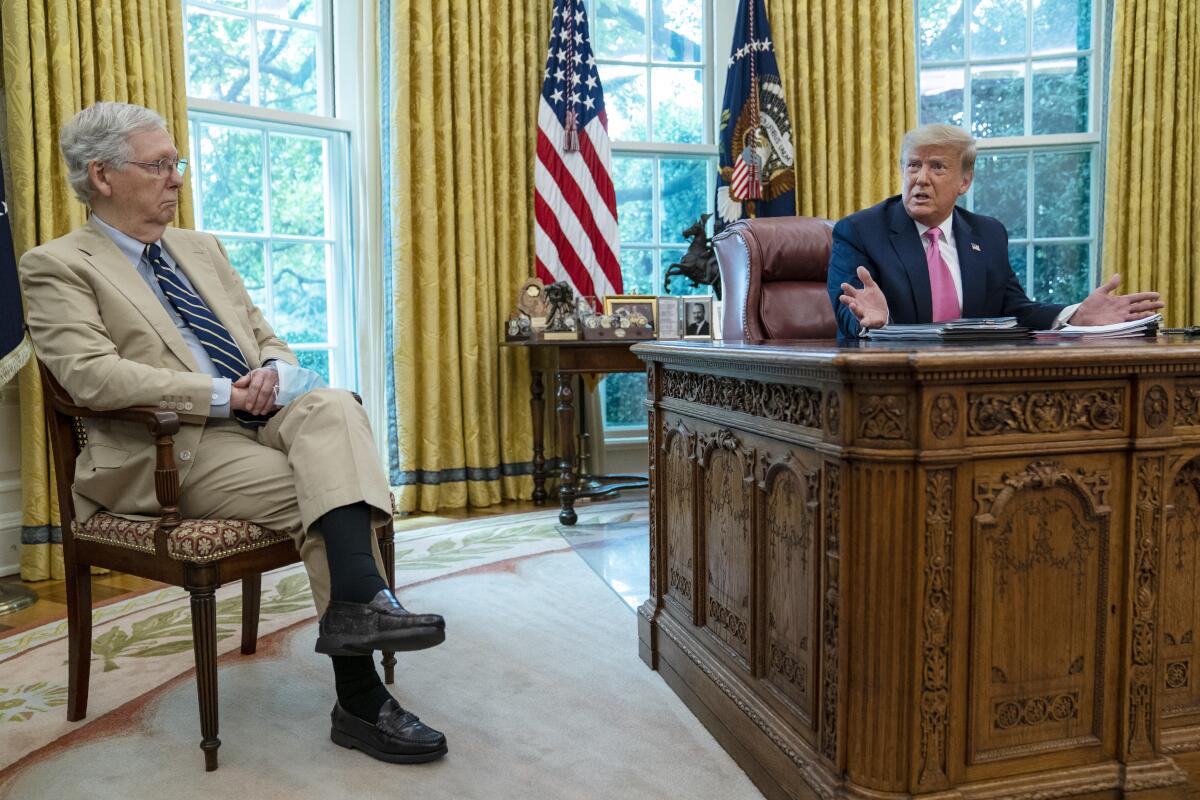
- Share via
As in so many other cases, George Orwell foresaw where power politics, unchecked, was destined to lead democratic societies.
His warning appeared in the closing pages of “1984.”
There the party functionary O’Brien paints the future for the protagonist Winston Smith.
“There will be no loyalty, except loyalty towards the Party,” O’Brien says.
Michelle and I wish you and Melania the very best as you embark on this great adventure, and know that we stand ready to help in any ways which we can.
— Barack Obama to Donald Trump, Jan. 20, 2017
“There will be no laughter, except the laugh of triumph over a defeated enemy. ... When we are omnipotent we shall have no more need of science. ... Always there will be the intoxication of power, constantly increasing and constantly growing subtler. Always, at every moment, there will be the thrill of victory, the sensation of trampling on an enemy who is helpless.”
Today’s Republican Party behaves as if O’Brien’s words have been etched into its platform. Republican office holders on Capitol Hill and in statehouses all across the country show no loyalty except to Donald Trump — bizarrely, given the imminent end of the Trump presidency.
Whatever political principles they once held seem to have vanished into thin air, except the principle that the only thing that matters is clinging to power.
In pursuit of that intoxicating goal, they deny science — the science of climate change, the science of public health in the teeth of a deadly pandemic. They thirst desperately for the thrill of victory over their opponents, whom they depict not as adversarial partners in governance, but as “the enemy.”
Biden doesn’t need a Democratic Senate to save American healthcare reform.
The crisis confronting our democracy today isn’t really Trump’s efforts, ham-fisted as they are, to subvert election law, cast doubt on the legitimacy of millions of properly cast ballots, and interfere with the peaceful transition from his administration to the next.
Those are bad enough, but what’s worse is the silence of his enablers in the Republican Party — their failure to publicly object and their propensity even to endorse his behavior.
The weeks since election day have demonstrated more vividly than one could have imagined that the GOP has relinquished its responsibility to perform, in a Democratic administration, as the “loyal opposition.”
The term originated in Britain, but in the U.S. it came to signify a shared commitment to keeping America a nation that could be governed, even if the two parties disagreed, if sometimes vehemently and even bitterly, over how to govern.
That commitment was not spelled out in the Constitution or in statute. Instead it was a recognition of norms, some of which dated back to the mid-19th century.
Among them was the cooperative transfer of power, exemplified by inaugural rituals in which the outgoing and incoming presidents sat shoulder to shoulder, if not always with corresponding smiles on their faces.
Welcoming letters from one to the next became something of a tradition. “You will be our President when you read this note,” George H. W. Bush wrote to Bill Clinton on Jan. 20, 1993. (Emphasis in the original.) “Your success now is our country’s success. I am rooting hard for you. Good luck.”
Possibly the tradition will end, if temporarily, by the message left for Trump by Barack Obama on Jan. 20, 2017 — “Michelle and I wish you and Melania the very best as you embark on this great adventure, and know that we stand ready to help in any ways which we can.”
It’s hard to imagine Trump writing anything of the kind to Joe Biden, whom he has continued to paint as the loser in their electoral contest, a stance he seems determined to continue until Jan. 20, 2021.
Biden wants more infrastructure and safety net investment. Trump wants to cut taxes. Which will aid the economy more?
Trump will be out of office that day. It’s not his behavior that should concern us anymore. It’s the behavior of his enablers in the Republican Party that’s truly disturbing.
To some extent, this shouldn’t be surprising. Republicans have endorsed through their silence the multiple civic and social crises caused by Trump’s presidency. They were silent when he refused to condemn violently racist mobs in Charlottesville, Va., in 2017, that resulted in one death (“people that were very fine people, on both sides”).
They were silent when his policy of separating children and infants from their mothers at the southern border turned America into one of the most malevolently inhumane governments on Earth.
They’ve been silent about the pseudoscience — nonscience, really — that has turned government agencies that were once the envy of the world for their ability to save lives, such as the Food and Drug Administration and the Centers for Disease Control and Prevention, into shells of themselves and global laughing stocks.
They participated willingly in Trump’s turning sensible public health practices like the wearing of masks into partisan litmus tests.
They’ve been silent about his relentless spew of lies about the coronavirus pandemic, which as of this week has caused more than a quarter-million American deaths. Amazingly, they’ve continued to support Trump’s negligence in this crisis even as the toll wreaks havoc among their own electoral base, and in the White House itself, and in their own Republican caucus rooms.
And now the Senate has decamped from Washington for a Thanksgiving holiday that is likely to bring more grief to more families. The unfinished business they left behind includes passing a relief bill to help the millions of Americans whose financial situation grows more perilous by the week.
The absence of statesmanship on this scale is worse than dereliction — it’s indistinguishable from a deliberate corrosion of American society itself.
The rot starts at the top of the Republican Party. At this writing, neither Senate Majority Leader Mitch McConnell (R-Ky.) nor House Minority Leader Kevin McCarthy (R-Bakersfield) has acknowledged President-elect Biden’s indisputable electoral victory, much less called Biden to offer their congratulations or express even pro-forma willingness to cooperate in solving America’s problems.
Neither has publicly urged General Services Administration chief Emily Murphy to cease blocking the transition from the Trump to Biden administrations, even though her delay could cost American lives.
Some Republicans want to let you know that they oppose Trump in their hearts—off the record. Some are claiming that they worked against him during his term—in secret.
Doesn’t count: No one still hiding behind off-the-record confidentiality deserves a dime’s worth of credence, or credit. Take a stand in public, or live in shame to the end of your days.
Longtime observers of the American political landscape look upon this conduct with horror.
“I have searched for the best word to describe the moral cowardice of Republican elected officials, party officials and opinion leaders, blowing up a transition with a deadly pandemic underway, undermining faith in our election and political system,” political scientist Norman Ornstein, a fellow at the American Enterprise Institute, a conservative think tank, tweeted recently. “The word is traitorous.”
It’s only fair to note that a very few Republicans have spoken out in public, notably Sen. Mitt Romney of Utah, a former presidential candidate, who on Thursday attacked Trump’s pressure campaign on state and local officials in Michigan, Georgia and Pennsylvania aimed at persuading them not to certify Biden as the victor in those states.
“It is difficult to imagine a worse, more undemocratic action by a sitting American President,” Romney tweeted. But he’s deeply in the minority.
It’s perhaps too facile to paint American history as a chronicle of shared devotion to democratic norms, especially since only one period has been graced with the label of the “era of good feelings” — 1815 to 1825, roughly the two presidential terms of James Monroe.
That’s when the decline of the Federalist Party produced an effective one-party rule in Washington under Monroe’s Democratic-Republicans; Monroe in his reelection campaign in 1820 won 231 of the 232 electoral college votes contested.
Other than that, American politics has often been an arena of bare-knuckled combat, and not only party-against-party. Franklin Roosevelt’s New Deal is often caricatured as a Democratic Party steamroller, but in truth some of FDR’s most ferocious adversaries were southerners in his own party, and some of his most devoted supporters were progressive Republicans.
Trump’s attack on the U.S. Postal Service goes beyond vandalism and undermines democracy.
FDR placed one of the latter, Harold Ickes, in his Cabinet as Interior secretary, and Ickes responded by becoming one of only two Cabinet members to serve Roosevelt for his entire 12 years in office. (The other was Frances Perkins, his secretary of Labor.)
Some of the high points of the American pageant are moments in which the two parties came together to meet a crisis. Ronald Reagan and then-House Speaker Tip O’Neill (D-Mass.) were fierce political adversaries but companionable personalities outside the political arena. Somehow they worked together to craft a tax bill both sides of the aisle could live with in 1982 and solve a Social Security funding crisis in 1983.
But Reagan is also responsible for undermining faith in government’s ability and inclination to succor ordinary Americans in their times of need. It was Reagan who began the erosion of the idea that government existed in the public interest with his deceitfully cheery quip that “the nine most terrifying words in the English language are: I’m from the government, and I’m here to help.”
Reagan made government, not poverty or need, the enemy. His outwardly sunny disposition licensed Republicans to make the stifling of American governmental resources into an essential party plank and an ideological article of faith. He restored Hoover’s principle of “rugged individualism” to the center of GOP orthodoxy.
The Republican proposal on coronavirus relief puts all the risk from catching COVID-19 on workers.
But Hoover’s “individualism” was never more than a scam.
“Whatever the economic system does permit, it is not individualism,” FDR brain truster Adolf A. Berle had written during the 1932 presidential campaign, “... When nearly seventy per cent of American industry is concentrated in the hands of six hundred corporations, ... the individual man or woman has, in cold statistics, less than no chance at all. ... What Mr. Hoover means by individualism is letting economic units do about what they please.”
That might explain the willingness of today’s GOP to go along with Trump’s most noxious policies, up to a point. As long as he was a partner in their project to remake the American economy for the benefit of their wealthy patrons, what was the harm? The more he stripped ordinary Americans, not to say immigrants, of their access to economic equality, the more there was for them.
As I asked in February after Trump claimed that the economy was “the best it has ever been” — Whose economy? Low-wage and middle-class Americans remained caught in the same vise that has been squeezing them for decades, while Trump tried to cut food stamp benefits and eroded the consumer protections of the Affordable Care Act. In the pandemic, which is raging completely out of control on Trump’s watch, the working class is getting creamed while the wealthy make out just fine.
But what explains the Republicans’ participation today in Trump’s deliberate erosion of democratic norms? There is absolutely no chance of reversing the results of the presidential election — not legitimately, anyway. Come Jan. 20, Trump won’t have any real power over GOP office holders. By hamstringing Biden’s transition, moreover, they’re setting themselves up to be excluded from consultation over policies that Biden can institute without congressional consent. (And he can do plenty.)
The only possible explanation is that they’ve become so accustomed to operating outside the norms of participatory democracy that they can no longer help themselves, any more than heroin addicts can stay off the smack. Like an an addict, they’ll pay anything for that momentary intoxicating sensation of power, not caring that the subsequent let-down may be long and severe.
That makes them dangerous as long as they have their hands on policy at all. If Biden is as clear-sighted as he seems to be, he won’t allow a single Republican anywhere near his White House.
More to Read
Inside the business of entertainment
The Wide Shot brings you news, analysis and insights on everything from streaming wars to production — and what it all means for the future.
You may occasionally receive promotional content from the Los Angeles Times.

